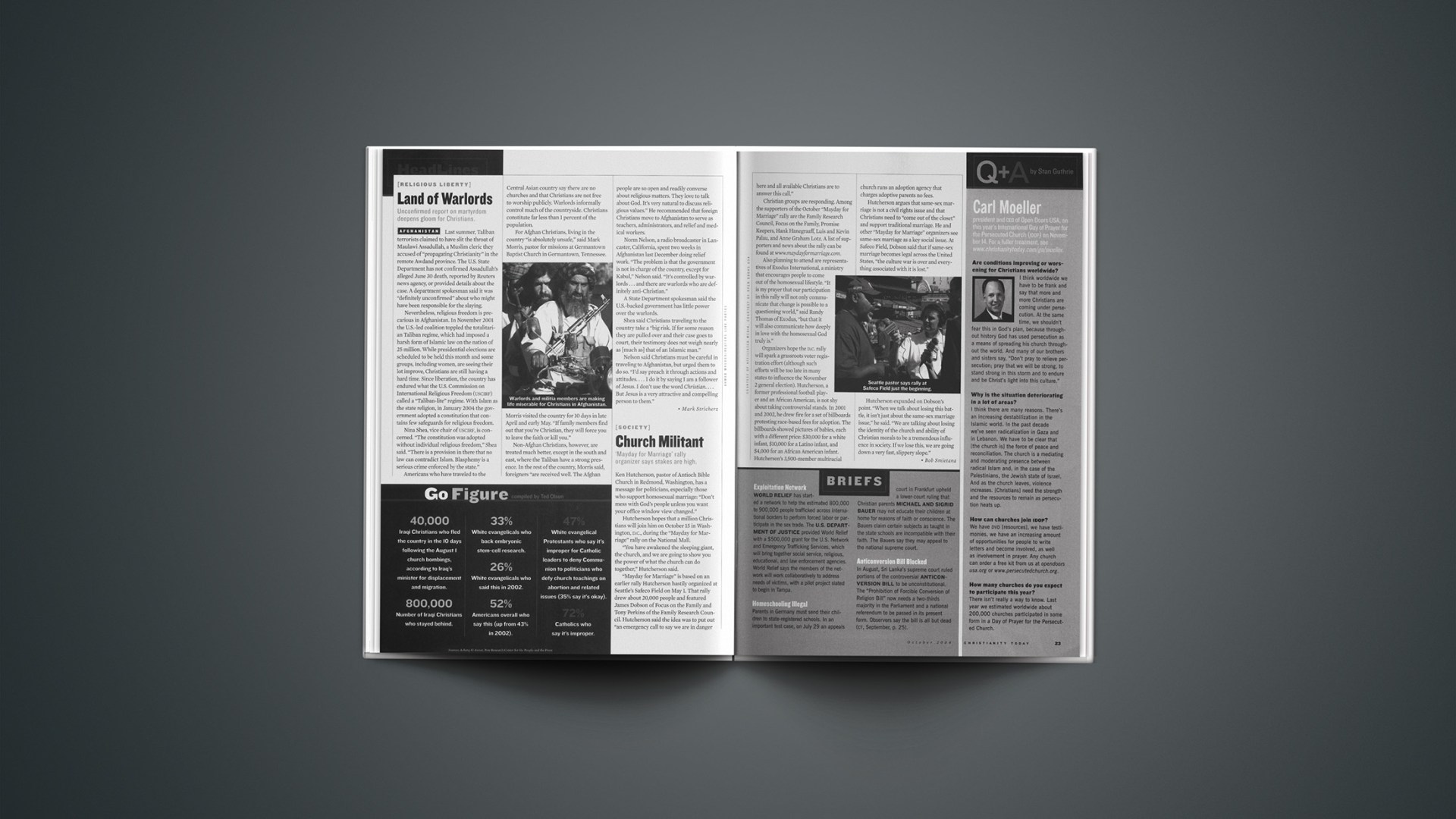Last summer, Taliban terrorists claimed to have slit the throat of Maulawi Assadullah, a Muslim cleric they accused of “propagating Christianity” in the remote Awdand province. The U.S. State Department has not confirmed Assadullah’s alleged June 30 death, reported by Reuters news agency, or provided details about the case. A department spokesman said it was “definitely unconfirmed” about who might have been responsible for the slaying.
Nevertheless, religious freedom is precarious in Afghanistan. In November 2001 the U.S.-led coalition toppled the totalitarian Taliban regime, which had imposed a harsh form of Islamic law on the nation of 25 million. While presidential elections are scheduled to be held this month and some groups, including women, are seeing their lot improve, Christians are still having a hard time. Since liberation, the country has endured what the U.S. Commission on International Religious Freedom (USCIRF) called a “Taliban-lite” regime. With Islam as the state religion, in January 2004 the government adopted a constitution that contains few safeguards for religious freedom.
Nina Shea, vice chair of USCIRF, is concerned. “The constitution was adopted without individual religious freedom,” Shea said. “There is a provision in there that no law can contradict Islam. Blasphemy is a serious crime enforced by the state.”
Americans who have traveled to the Central Asian country say there are no churches and that Christians are not free to worship publicly. Warlords informally control much of the countryside. Christians constitute far less than 1 percent of the population.
For Afghan Christians, living in the country “is absolutely unsafe,” said Mark Morris, pastor for missions at Germantown Baptist Church in Germantown, Tennessee. Morris visited the country for 10 days in late April and early May. “If family members find out that you’re Christian, they will force you to leave the faith or kill you.”
Non-Afghan Christians, however, are treated much better, except in the south and east, where the Taliban have a strong presence. In the rest of the country, Morris said, foreigners “are received well. The Afghan people are so open and readily converse about religious matters. They love to talk about God. It’s very natural to discuss religious values.” He recommended that foreign Christians move to Afghanistan to serve as teachers, administrators, and relief and medical workers.
Norm Nelson, a radio broadcaster in Lancaster, California, spent two weeks in Afghanistan last December doing relief work. “The problem is that the government is not in charge of the country, except for Kabul,” Nelson said. “It’s controlled by warlords … and there are warlords who are definitely anti-Christian.”
A State Department spokesman said the U.S.-backed government has little power over the warlords.
Shea said Christians traveling to the country take a “big risk. If for some reason they are pulled over and their case goes to court, their testimony does not weigh nearly as [much as] that of an Islamic man.”
Nelson said Christians must be careful in traveling to Afghanistan, but urged them to do so. “I’d say preach it through actions and attitudes. … I do it by saying I am a follower of Jesus. I don’t use the word Christian. … But Jesus is a very attractive and compelling person to them.”
Copyright © 2004 Christianity Today. Click for reprint information.
Related Elsewhere:
Recent Christianity Today coverage of Afghanistan includes:
Rebuilding Afghanistan U | How Christian scholars are using their heads to change people’s hearts at universities worldwide-including the one Osama bin Laden used to roam. (Dec. 12, 2003)
Books & Culture’s Books of the Week: Remember Afghanistan? | Two inside reports (Nov. 10, 2003)
Threatened Aid Groups Retreat from Afghanistan | In a “new and disturbing twist,” rebel forces target international agencies (May 15, 2003)
Letter from Kabul | Religious freedom still in jeopardy under new Afghan government (Apr. 21, 2003)
Return to Kabul | Shelter Now’s Georg Taubmann talks about ministry and security in the former Taliban state. (Jan. 17, 2003)
Afghanistan Before September 11 | A Christian relief worker talks about the terror inside the war-ravaged country and his prayers for change. (Sept. 10, 2002)
Double Jeopardy | Former Taliban hostages Dayna Curry and Heather Mercer talk about the risks they took, the imprisonment they suffered, and their hopes to return to ‘the hardest place on Earth.’ (June, 28, 2002)
‘Their Faith and Courage Has Strengthened Me’ | Heather Mercer and Dayna Curry speak about Martin and Gracia Burnham. (June 28, 2002)
The U.S. State Department and U.S. Commission on International Religious Freedom both have reports on religious repression and freedom in Afghanistan.










